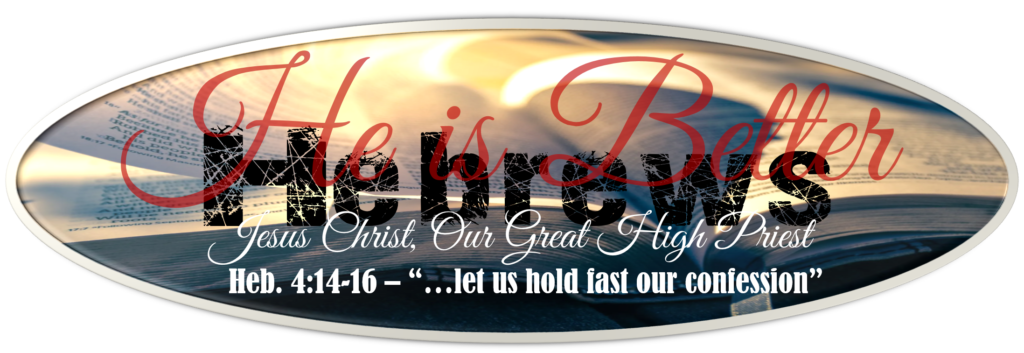
Hebrews 3:1-4:13
God’s Faithful Servant Jesus
This session begins a study of Heb. 3:1-6, which centers on the second major point of the book, Christ’s superiority to Moses. This study also looks at the writer’s second warning in Heb. 3:7-4:13, with 26 verses the longest warning in the book, dealing with the temptation to “drift away” from our faith. The writer’s ma![]() in theme (as he writes primarily to Jewish Christians) is that “Christ is Better”, He is qualified to be our Great High Priest because He is superior to all the preceding leaders and voices of the Jewish faith, the faith of Abraham in the One True God. In the first two chapters, he has dealt with the secondary voices of the angels, as the Son is higher/better than them as an exact representation of God, not just a messenger. Now in Hebrews 3, he turns to the venerable patriarch Moses, one of the most revered leaders of the Jews. He had spoken with God “face to face” (Exo. 33:11), and God revealed the Law through him (Neh. 9:14). Note in Heb. 3:1 that the writer is addressing those who are
in theme (as he writes primarily to Jewish Christians) is that “Christ is Better”, He is qualified to be our Great High Priest because He is superior to all the preceding leaders and voices of the Jewish faith, the faith of Abraham in the One True God. In the first two chapters, he has dealt with the secondary voices of the angels, as the Son is higher/better than them as an exact representation of God, not just a messenger. Now in Hebrews 3, he turns to the venerable patriarch Moses, one of the most revered leaders of the Jews. He had spoken with God “face to face” (Exo. 33:11), and God revealed the Law through him (Neh. 9:14). Note in Heb. 3:1 that the writer is addressing those who are  “partakers of the heavenly calling.” That includes us today, as 21st century Christians, as we have responded to the call of God to place our faith in the risen Lord Jesus. “Partakers” is a special term in Hebrews (1:9; 3:14; 6:4; 12:8, and only one other use in the NT where it refers to the disciples being partners in their boat). This special term points us to God’s faithful followers from all ages who have a common belief and benefit in the blessings of God’s provisions and future dominion with Christ.
“partakers of the heavenly calling.” That includes us today, as 21st century Christians, as we have responded to the call of God to place our faith in the risen Lord Jesus. “Partakers” is a special term in Hebrews (1:9; 3:14; 6:4; 12:8, and only one other use in the NT where it refers to the disciples being partners in their boat). This special term points us to God’s faithful followers from all ages who have a common belief and benefit in the blessings of God’s provisions and future dominion with Christ.
Imagine being at the wheel of a sleek 30’ sailboat for a leisurely afternoon cruise when a sudden storm starts howling – yeow! But what better way to learn what it means to “hold fast”! That picture helps us to understand why the writer to the Hebrews used the phrase to describe our approach to staying faithful to our faith. The word means to “hold the course”, eyes on the compass, knowing the bearing to stay on, both hands tight on the wheel. In our daily walk as a Christian, our faith in Christ establishes our bearing, the course we need to follow. But storms do come up, sometimes without warning. Are we ready? Is our confidence in Christ already settled? Difficult times should never be able to take our heart and our eyes off of the Savior. Just like Moses, we are part of God’s work of Redemption, and we would do well to take Moses’ example as a servant to heart – he certainly faced more than his share of storms in his life!

The Builder of the House – Heb. 3:1-6
The Jews understandably had deep loyalty to their founders, and the writer knew his letter would be read by many Jewish Christians. Abraham is the Father of the Hebrews, the father of many nations (Gen. 17:5), as the Bible and other historical documents report all civilizations streaming out from him through ![]() the next centuries. After Jacob went down to Egypt with his son Joseph, Israel fell into slavery for 400 years, but then Moses rose up not only to lead his people out of bondage, but also to journey back to Canaan to conquer the land with God’s blessing. Moses stands tall as a great hero of the Jewish faith, but the writer now makes it clear that “Christ is Better”:
the next centuries. After Jacob went down to Egypt with his son Joseph, Israel fell into slavery for 400 years, but then Moses rose up not only to lead his people out of bondage, but also to journey back to Canaan to conquer the land with God’s blessing. Moses stands tall as a great hero of the Jewish faith, but the writer now makes it clear that “Christ is Better”:
- Christ was the builder of the “house” of Israel, Moses was a part of the house (3:3)
- Christ was over the house, Moses was in it (3:5-6)
- Christ was as a Son while Moses was as a servant (3:6)
- Christ was the revealer while Moses testified to the revelation (3:5b).
Now alongside this great tradition of Moses, in Heb. 3:1, the writer addresses Jesus as the Apostle and High Priest of our faith – two superior designations that speak of Jesus’ office and function for believers of all ages. He is the official messenger or ambassador, and He is the final provider of the way of our salvation. Note that the writer takes two words from Heb. 2:17 to guide  his thoughts through the next three sections of the letter: Christ as being “faithful” (Heb. 2:17 and 3:1-6), and the need for His followers to be faithful (Heb. 3:7-4:14), then how Jesus Christ is our “merciful” High Priest (Heb. 4:15-5:10). Note that as amazing as the writer’s line of thinking is here, his final conclusion in Hebrews 8-10 even more amazing.
his thoughts through the next three sections of the letter: Christ as being “faithful” (Heb. 2:17 and 3:1-6), and the need for His followers to be faithful (Heb. 3:7-4:14), then how Jesus Christ is our “merciful” High Priest (Heb. 4:15-5:10). Note that as amazing as the writer’s line of thinking is here, his final conclusion in Hebrews 8-10 even more amazing.
In Heb. 3:1-6, the writer takes the same approach as in Heb. 1-2 regarding angels, that is: Christ is Better! Moses is known for the Law and specifically the Tabernacle and its sacrifices. Now we know from the New Testament that the old tabernacle was a picture of heavenly truths (Heb. 8:5, the spiritual holy of holies of God’s presence). Jesus is pictured as the Builder of the “household of faith”, while Moses was a servant in the household. Note the important emphasis of God’s inspired Word, which states that Christ is worthy of more honor as builder of the house. As background to this comparison, note that Jesus spoke of His superior relationship to Moses in Jn. 5:36-38, 45-57. Moses was a “shadow” or “type” which served to tell us more about the fulfillment when the Messiah, Jesus Christ, finally came. Heb. 3:6-19 is our challenge to “hold fast” to the faith we have in Christ and God’s Redemption, warning us, “If you don’t hold fast…”, and failed faith is falling into doubt and unbelief. Heb. 3:14 emphasizes that we do “partake” of Christ “if we hold fast”. The author knew he was writing Christians who believed in Christ, but he also knew there were serious attacks happening on their faith and he wanted to encourage and challenge them to understand how important it was to stay “faithful to their faith”.
Note the thoroughness and harmony of the writer’s message as he continues to encourage us to ignore doubt and be faithful. After quoting Psa. 95:7-11 as a whole, he comes back to reference a part of the quote in several following verses in order to use the “rest” that the Jews anticipated in Canaan to be reflected in the believer’s life of rest in Christ and especially our eternity with God (3:15, 4:3,7, 9 – see also Eph. 1:3,11, 15-23; Heb. 12:28). For us today, this “rest” is the “inheritance rest” that look forward to in heaven as promised by God (Heb. 4:10).
Warning #2: Doubting – Heb. 3:7-4:13
Hebrews 3:7-4:13 is the second of the five warning passages in Hebrews, and underscores the importance of our not neglecting our faith. (Click here to review the outline chart which shows how the warning passages fit into the overall plan of Hebrews.) We can all be guilty of this, sincerely believing in God and the Bible and Jesus as our Savior, but we let ourselves coast along in the “busy-ness” of life without spending quality time to seriously get to know God and His Word deeply. In reality, if we let this happen, it’s as if we weren’t sure about all those great truths about God. If we really do have faith in Christ and His Salvation, if we really do believe we have a “blessed hope” (Titus 2:13) that assures us of and eternity of life in God’s presence, then we surely need to hold tight to that faith like the great treasure that it is! This warning is aimed at helping us to deal with the doubting which can eat away at our holding tight.
One of the most startling words in this warning is in Heb. 3:13, saying that we can become “calloused” or “hardened” in our Christian life. Think about how sad it would be to have our Christianity described that way! We can become defeated if we listen to negative attitudes, or we can be confused by frustrated desires. Another way understand the word is “apostasy”, an actual abandonment of what we have committed, giving up on on it and leaving it behind, as it is expressed in 1 Tim. 4:1. One way or another, the issue the writer is dealing with in this warning ends up being demonstrated by the Christian who follows his or her sinful human nature rather than the leading of the Holy Spirit (see Rom. 7). Sometimes we are tempted to engage in the world’s “worship”, all the distractions and recreations that people resort to for satisfaction. The fact remains that the more you turn away and ignore God’s Truth, the more hardened you become, and the writer suggests you can even become antagonistic to true faith like the Jews in the wilderness . This is why the writer writes so strongly, repeating the word “Today!” in order to get our attention. Eph. 5:14-16 tells us that “time is life”, we need to make the most of our life in Christ, don’t be lazy but instead shine for Christ. Heb. 4:1 warns us not to come up “short” in our Christian life!
. This is why the writer writes so strongly, repeating the word “Today!” in order to get our attention. Eph. 5:14-16 tells us that “time is life”, we need to make the most of our life in Christ, don’t be lazy but instead shine for Christ. Heb. 4:1 warns us not to come up “short” in our Christian life!
The writer quotes Psalm 95 to call this casual Christianity a “hardened heart”, and compares it to the Jewish people who were miraculously delivered from Egypt by God, then they started complaining and wandering in the desert for 40 years. The writer then says Heb. 3:12 that this wandering amounted to unbelief, and he challenges each of us to check ourselves and make sure we’re not wandering like Israel was. In Heb. 3:14, he says that we have to “hold fast” to our confidence in Christ, it needs to be a singular, distinguishing influence in our life. As Christians, we have the promise from God that we will be blessed with an eternity of rest from this troubled life, and that is our very precious “blessed hope” (Tit. 2:13). It is sad state of affairs if we “default” back into a defeated, worldly manner of life. At the conclusion of this passage, in Heb. 4:11, we are told to be “diligent” in keeping our faith at the front of our thinking, letting it influence all of our life choices and decisions. We have the powerful Word of God (Heb. 4:12) in our hands and hopefully in our hearts, but we are also accountable to God to be faithful to Him and His Word.
Note that while the writer leans heavily on OT material, God also inspires him to write new, “New Testament” truth. This includes the excellent revelation about the character of the Bible in Heb. 4:12, which is understood to be an extension of the actual words of God. Here we are reminded that it is both nourishing and strengthening, and also an instrument of conviction and judgment (compare Christ’s two-edged Sword in Rev. 1:16). The Word of God is spiritually alive, compared to a small dagger with a razor-sharp edge – able to penetrate and expose the heart. The word “judge” is in reference to God as our judge, able to examine down to the finest detail to see the intents of our heart. The writer is cllearly intent on emphasizing the importance of our living an “enthusiastically faithful” for Him. He alone is “Him to whom we must give account”!
The warning ends on this note of the power of God’s Word, and the next section of Hebrews begins with Heb. 4:14 as we are challenged to look to our Great High Priest and hold fast to our confession of faith in His finished work of the Cross. But that is to be covered in the next study session….
![]() Bible Study Journal
Bible Study Journal
-
- The “calling” of Heb. 3:1, throughout the New Testament, is God’s privileged invitation to those of us who have believed. Make notes of what more you can learn about this calling from these verses: Rom. 11:29; Eph. 1:18; 2 Thess. 1:11; 2 Pet 1:10; 1 Cor. 1:26.
- We who believe in Christ are “partakers” and “partners” in the faith, in the boat together (see 3:1 above). Look up each of these five verses in Hebrews that use the term and put together a description of our Christian fellowship. (1:9; 3:1,14; 6:4; 12:8)
- As quoted in Heb. 3:9, the Jewish founders rebelled against God in the wilderness. Could that happen again today? Why does the writer mention that failure?
- Heb. 3:13 calls sin “deceitful”. What does that mean to you? Have you seen it happen?
- Heb. 3:13 mentions exhorting each other. What does that mean we should do? Do you have that kind of connection with other Christians?
- Heb. 3:11-13 is a major stand-alone declaration – but how do these verses connect with Heb. 4:1-10? Context is always importand, so how do these verses connect with what is going to be said in Heb. 5?
- Consider Jer. 16:17; 17:9-10; 23:24 to see another view of just how clearly God evaluates the heart of man.
- What does Heb. 3:14-16 teach us about how we can keep ourselves from neglecting our faith?
- Had you read those verses in Eph. 5:14-17 before? In what ways do those verses tell you how to live your Christian life?
- The Word of God is a spiritual sword. What do you learn from Eph. 6:17 and Heb. 4:12 about this profound truth? How does the Word help us to declare and discern (separate out) Truth?




